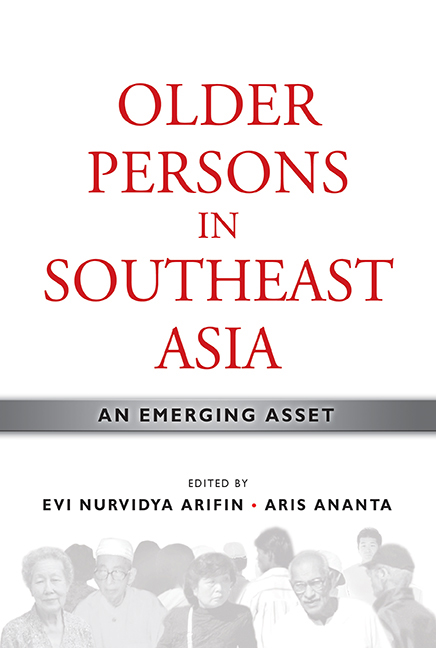Book contents
- Frontmatter
- Contents
- List of Tables
- List of Figures
- Foreword by Hal Hill
- Message from the Director
- Preface
- Contributors
- PART I INTRODUCTION
- PART II OLD-AGE INCOME SECURITY
- PART III EMPLOYMENT AND OTHER SOURCES OF FINANCIAL CONTRIBUTION
- PART IV AGEING, MIGRATION, AND DEVELOPMENT
- 11 The Nexus of Ageing and Migration in Singapore
- 12 Overseas Labour Migration and Well-being of Older Filipinos
- 13 Urbanization and the Ageing Community in Sarawak, Malaysia
- PART V ROLES OF GOVERNMENT AND CIVIL SOCIETY
- Index
13 - Urbanization and the Ageing Community in Sarawak, Malaysia
from PART IV - AGEING, MIGRATION, AND DEVELOPMENT
Published online by Cambridge University Press: 21 October 2015
- Frontmatter
- Contents
- List of Tables
- List of Figures
- Foreword by Hal Hill
- Message from the Director
- Preface
- Contributors
- PART I INTRODUCTION
- PART II OLD-AGE INCOME SECURITY
- PART III EMPLOYMENT AND OTHER SOURCES OF FINANCIAL CONTRIBUTION
- PART IV AGEING, MIGRATION, AND DEVELOPMENT
- 11 The Nexus of Ageing and Migration in Singapore
- 12 Overseas Labour Migration and Well-being of Older Filipinos
- 13 Urbanization and the Ageing Community in Sarawak, Malaysia
- PART V ROLES OF GOVERNMENT AND CIVIL SOCIETY
- Index
Summary
Beginning in the 1970s, urbanization in Sarawak has been developing at an unprecedented pace. While the resultant socio-economic transformation impacting on the lives of different groups and communities has continued to be a fertile site of study (Abdul Majid Mat Salleh et al. 1990; Abdul Halim Ali et al. 2006; Hew 2003, 2007; Hong 1987), the experiences of the ageing community in the wake of urbanization remains understudied. How has urbanization impacted the older persons of Sarawak? Are the benefits of development brought about by urbanization reaching the ageing community who, in the last few decades, has been an active contributor towards the urbanization process? Are these benefits equally distributed among all members of the ageing community? These are pertinent questions to raise, particularly with respect to the increasing population ageing, a trend similar to the global trend, which results in new emerging issues and challenges for the care and support of older persons. Furthermore, the social and geographical landscape of Sarawak presents issues unique to itself, which tend to be overlooked in studies done in other states of Malaysia or in national policy formulations for older persons, underscoring the importance of examining these questions.
This chapter examines the impact of urbanization on the older persons of Sarawak, focusing specifically on social and economic support available to them. The empirical data, both quantitative and qualitative, are drawn primarily from a study conducted between 2003 and 2004 on “Ageing in Sarawak: Impact, Needs and Emerging Issues” (Social Development and Urbanization Council 2005). As the study only covered three Divisional Administrative areas, namely Kuching, Sibu, and Miri (which are the most urbanized) and a sample of 600 respondents aged 55 and above, the findings is not intended to be representative or conclusive. Nevertheless, the proportionate stratified sampling procedure and an additional purposive sampling of seventy-five respondents allowed for an analysis of emerging issues and trends, as well as rural/urban variations, class, ethnicity, and gender differences related to ageing.
The chapter begins with an examination of the nature of urbanization in Sarawak and highlights some of the consequences which pose implications for the ageing community. This is followed by looking at the income and social support of the increasing number of older persons. The findings suggest that for certain groups of them, their contributions during their younger years have been undervalued and inadequately acknowledged.
- Type
- Chapter
- Information
- Older Persons in Southeast AsiaAn Emerging Asset, pp. 335 - 358Publisher: ISEAS–Yusof Ishak InstitutePrint publication year: 2009



